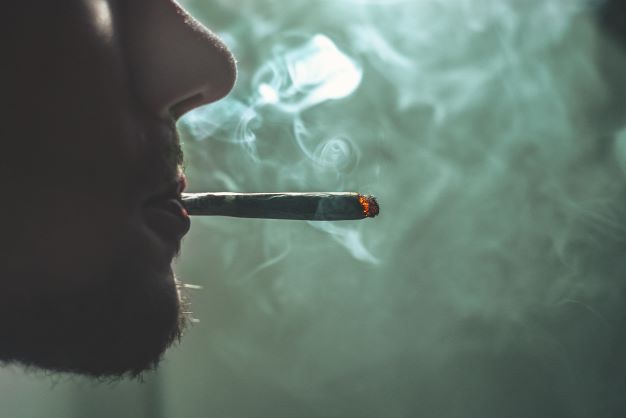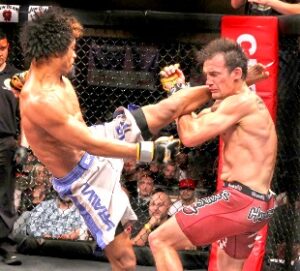
Are you wondering if UFC (MMA) fighters are allowed to smoke weed?
In this article, we’ll look at whether UFC fighters are allowed to smoke weed and the various rules concerning weed use, and how those rules have changed over time.
Contents
Are UFC Fighters Allowed to Smoke Weed?
Yes, UFC fighters are allowed to smoke weed, but when, where, and how much depends on the State Athletic Commission regulating an upcoming UFC event.
On January 14, 2021, the UFC and the United States Anti-Doping Agency (USADA) changed their anti-doping policy to the position of no longer punishing athletes for positive tests of carboxy-THC, the principal psychoactive ingredient of cannabis out of a possible 120.
This means that under these rules, UFC fighters are allowed to smoke up until the day of a fight, but not on fight day.
This is checked by a visual check and a cognitive behavioral test where they’re asked a few questions, their eyes are checked, and other obvious signs of THC use are examined.
If a fighter is impaired as determined by the checks, a fighter will be pulled from a fight and referred for drug treatment (yet to happen). The reason fighters are only checked this way is that blood level detection of THC can indicate usage from up to a month prior to a fight, if not longer; meaning tests are useless.
Despite the UFC legalizing weed use for its fighters in January 2021, this wasn’t a free pass for fighters to start smoking weed as it’s still considered a banned substance by all State Athletic Commissions.
When tested before a fight, athletes aren’t allowed a THC content above 150 ng/mL, the amount considered a doping violation by all commissions.
However, the Nevada State Athletic Commission was the first to legalize weed use for MMA athletes and boxers on July 7, 2021, 6 months after the UFC. The reason they followed suit is they believe weed isn’t a performance enhancer.
However, at the time of writing (September 2022) the NSAC is the only commission to have legalized weed use, meaning UFC and MMA fighters still have to be careful not to have a THC content over 150 ng/mL when it comes to UFC events outside of Nevada. The events in Nevada are held at the UFC Apex and the T-Mobile Arena.
So yes, while UFC fighters are allowed to smoke weed, that’s only backed by the UFC, USADA, and NSAC. All other commissions have marijuana (weed) as a prohibited substance and UFC (MMA) fighters can be punished if they test for a THC content over 150 ng/mL in their urine test during fight week.
Essentially, this means UFC fighters should generally avoid smoking weed for roughly 1 month before an upcoming UFC event and until after their post-fight drug test at all events outside of Nevada. Outside of this, it’s perfectly legal and allowed depending on the legality in the state they smoke in.
However, the time taken for THC levels to drop below 150 ng/mL is completely variable and different for each fighter. Some may get below the level in a day or two, and for others, it may take months. It’s up to each individual fighter to speak with their doctor about the best way to get clean come testing.
The only other exception to the rule is if a fighter manages to get a Therapeutic Use Exemption (TUE) for medicinal marijuana use, which they can give to every State Athletic Commission before a fight.
This exempts them from punishment if they’re over the THC threshold during testing but doesn’t allow them to smoke on fight day.
However, TUEs have been notoriously hard for UFC fighters to get a hold of, with Elias Theodorou becoming the first fighter to get a TUE for weed in 2020. A UFC fighter from 2014-2019, Elias had been denied a TUE exemption for marijuana on multiple occasions by USADA, and he remains the only fighter to get one.
Why Are UFC Fighters Allowed to Smoke Weed?
UFC fighters are allowed to smoke weed because the UFC and USADA determined it isn’t a performance-enhancing drug, where the sole purpose of partnering with USADA is to catch fighters cheating through PED use.
Overall, the UFC and USADA believe:
- Weed isn’t performance-enhancing
- Weed is a nonabusive substance
- A lot of UFC fighters use weed instead of more dangerous and addictive drugs, especially antidepressants and addictive painkillers
- UFC fighters should be able to use weed for pain control and relief, anti-anxiety, and sleep
- They should focus on preventing cheating and not on unnecessarily punishing athletes for smoking weed as it doesn’t impact the fairness or safety of competition (as long as it’s not used on fight day)
Even before they legalized weed use for UFC fighters, USADA was much more lenient on marijuana than State Athletic Commissions. Recreational weed use was permitted as long as it was out of a fighter’s system by the time they were tested for it during fight week.
Since partnering with the UFC in 2015, USADA has only penalized 3 UFC fighters for THC violations. They were Diego Brandao in 2016, suspended for 9 months, Kelvin Gastelum in 2017, suspended for 6 months, and Cynthia Calvillo in 2018, suspended for 6 months.
Ultimately, there’s a discrepancy between one side which is the UFC, USADA, and the NSAC, and the other side which is all other State Athletic Commissions.
While law changes and politics are notoriously slow in America, now that one commission has followed suit, it’s expected the rest will follow in time.
Is Marijuana Performancing Enhancing? (Why State Athletic Commissions Don’t Allow UFC Fighters to Smoke Weed)
State Athletic Commissions don’t allow UFC fighters to smoke weed (except Nevada) because they follow the laws set by the World Anti-Doping Agency, which maintains weed is illegal in sport, as explained in a 2011 paper published by WADA in Sports Medicine. The paper read:
- “ ‘Athletes who smoke cannabis or Spice in competition potentially endanger themselves and others because of increased risk-taking, slower reaction times, and poor executive function or decision making.
- Based on current animal and human studies as well as on interviews with athletes and information from the field, cannabis can be performance-enhancing for some athletes and sports disciplines.
- Use of illicit drugs that are harmful to health and that may have performance-enhancing properties is not consistent with the athlete as a role model for young people around the world.’ ”
Based on this, it seems most State Athletic Commissions believe smoking weed to be performance-enhancing and a health and safety concern, and therefore should be kept prohibited.
However, around the time the UFC legalized weed, the California State Athletic Commission made changes so that UFC fighters who test positive for THC above 150 ng/mL face only a 100$ fine.
This means at UFC events in California, there are no longer any suspensions, fight results being overturned to no contests, fighters losing bonuses, or being fined a percentage of their total winnings. More so, it means UFC fighters can smoke weed (except on fight day) and face a maximum $100 fine.
Overall, with the way weed is becoming legal throughout the United States, with 19 states fully legalizing weed and 38 allowing medicinal use, it seems within a few years that UFC fighters will be able to legally smoke weed in any state up until the day of a fight, as more State Athletic Commissions follow suit.
That being said, everything discussed above relates to the legality of weed use among UFC fighters in America.
While the UFC is an American organization that mostly operates there, they also host many UFC events outside of America; meaning UFC fighters are prohibited from smoking weed in many countries, and whether they can smoke weed or not is mostly dependent on event location.
For example, the UFC hosts events in Brazil, where weed is illegal and only permitted for medicinal use. For events in the UK, weed is illegal, and even medicinal prescriptions are very rare. For events in Australia, weed is only available medically.
For all events on Fight Island they’ve held after January 2021, fighters are likely to have been able to smoke weed right up until they’ve flown to UAE.
This is because the UAE MMA Federation is undeveloped and is only shadow-sanctioning events in their own country, behind the lead of the UFC who are using the NSAC ruleset there.
As a whole, UFC fighters are allowed to smoke weed for the most part in America, but when preparing for UFC events outside of America, whether they can smoke weed comes down to the country’s laws and the commissions in charge there; which is mostly a resounding no with some exceptions.
Luckily for UFC fighters who smoke weed, from the UFC’s 500th event (UFC 244) on November 2, 2019, to its 620th (UFC 279) on September 10, 2022, 96 events out of 120 have been held in America – 80% of every event in nearly 3 years while many events were also held on Fight Island.
Are UFC Fighters Allowed to Smoke / Vape CBD?
Yes, UFC fighters are allowed to smoke or vape Cannabidiol (CBD). CBD is one of the 120 cannabinoids found in weed, and in 2019, WADA exempted CBD from the prohibited substance list. This means UFC and MMA fighters can use CBD in any amount and at any time, even on the day of a fight.
CBD can either be smoked or vaped. The most common way is to vape with CBD oil but it can also be smoked with hemp, also known as hemp flower, or CBD flower.
In 2018, the Farm Bill was enacted in the USA which redefined marijuana (weed) as any cannabis plant containing 0.3% or more THC, and hemp as a plant containing less than 0.3% of THC.
This means UFC fighters can smoke CBD flowers and avoid going over a THC content of 150 ng/mL, however, they should proceed with caution and stick to just oil before testing occurs to be on the safe side.
UFC Fighters Sanctioned for Marijuana (Weed)
Here are some unlucky UFC fighters sanctioned for weed use before the UFC, USADA, and the NSAC decided to perform a 180.
1. Matt Riddle
Matt Riddle was a strong advocate for marijuana use throughout his 5-year UFC career (08-13).
In 2012, his win at UFC 149 against Chris Elements was overturned to a no contest and he was suspended for 3 months by the Calgary Athletic Commission (CAC) in Canada; despite having a medical license for use in the United States.
7 months later, Matt Riddle again tested positive for marijuana after his win against Che Mills UFC on Fuel TV 7. His win was overturned to a no contest and this time the UFC released him.
Matt said he quit smoking weed 3 weeks out from the fight but still tested positive for metabolites, showing that some fighters may need a month or longer to have the metabolites out of their body in time.
Dana White said Riddle wasn’t released for marijuana use but for comments made about beating his children. Riddle maintains his release was personal, as he was so vocal about how many fighters were on testosterone therapy replacement and how it was strange that it was legal and weed wasn’t.
In the end, discounting the no-contests, Matt Riddle was a UFC fighter on a 4 win streak whose marijuana use got him in trouble; whereas today he’d likely be fine with smoking weed.
2. Nick Diaz
The brothers, Nick and Nate Diaz are well known for advocating weed smoking throughout their UFC careers. They’re both from California which was the first state to legalize medical marijuana in 1996 and in 2016 they became one of the first to fully legalize it.
However, in 2015 Nick Diaz was handed a five-year suspension and a $165,000 fine by the NSAC for testing positive for marijuana metabolites after his UFC 183 loss. The sanctions were so heavy because it was Nick’s third marijuana-related offense.
What made these sanctions worse, was how Anderson Silva tested positive for anabolic steroids after the fight and was only suspended for 1-year, while Nick Diaz was suspended for 5 years at a time when marijuana was being legalized all around the country.
However, these sanctions were taken to court and were eventually reduced to 18 months and a $100,000 fine. Being from California, Nick maintained his position as a medicinal marijuana user but was still required to submit a clean urine sample before he could be reinstated to fight again in 2016.
He didn’t fight again until 2021.
3. Niko Price
In December 2020, just 8 months before the NSAC legalized weed use for MMA fighters and boxers, the NSAC handed Niko Price a 6-month suspension and an $8,500 fine for having a carboxy-THC content above 150 ng/mL. Also, his bout with Donald Cerrone was overturned from a Majority Draw to a No Contest.
The Bottom Line
So, ‘are UFC fighters allowed to smoke weed?’
UFC fighters are allowed to smoke weed, as per the UFC and USADA removing it as an illegal substance.
The exception is that they can’t smoke on fight day and marijuana (weed) is still deemed a prohibited substance by the majority of the State Athletic Commissions, meaning UFC fighters can smoke weed but it’s highly dependent on event location.
In locations it’s prohibited, UFC fighters can smoke weed but they should discontinue use roughly 1 month or longer before an event and until post-fight testing has taken place in order to avoid a carboxy-THC content of 150 ng/mL and over.
Currently, the exception is in Nevada, as the commission has legalized weed use for MMA fighters and boxers, meanwhile, the CSAC only has a 100$ penalty, so for events in California, many fighters will likely smoke weed as they please up until fight day.
By 2025, it’s highly likely all State Athletic Commissions will legalize weed use for combat sports, as research suggests that marijuana isn’t performance-enhancing.




